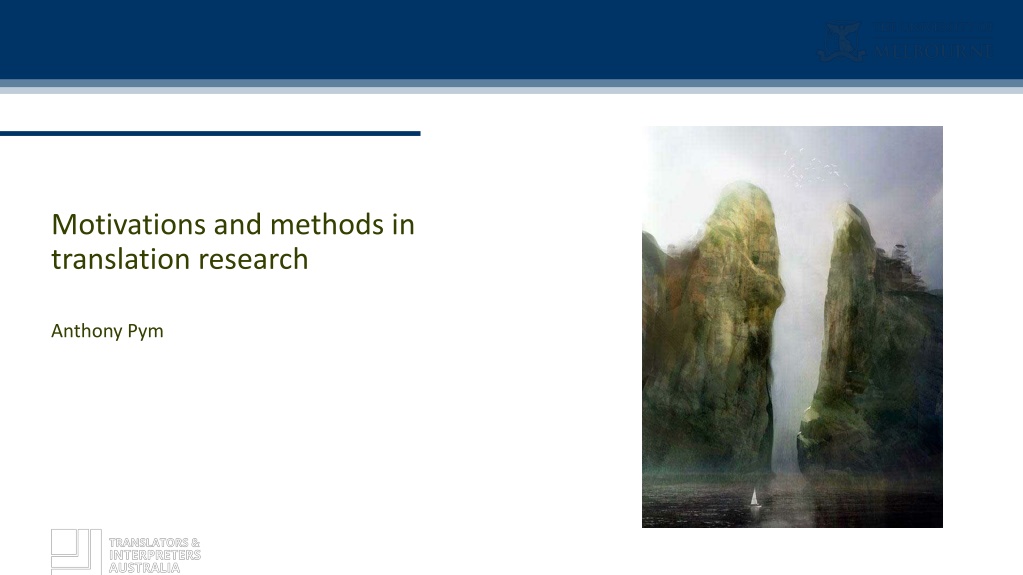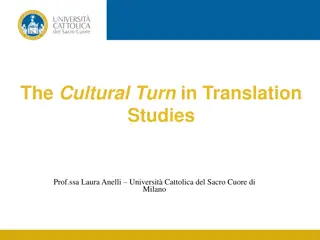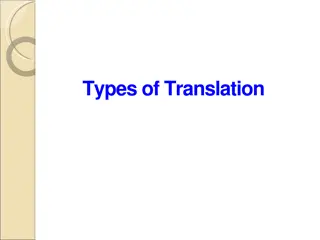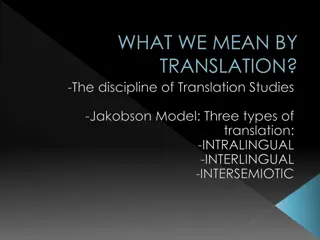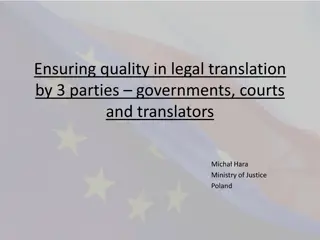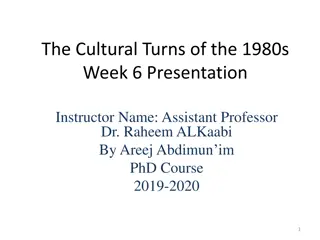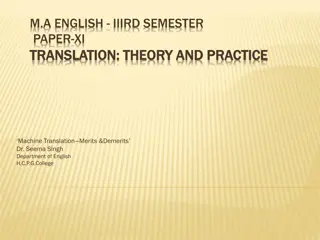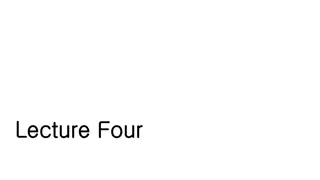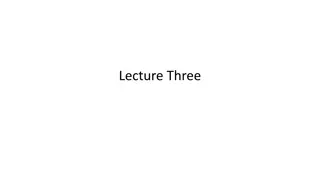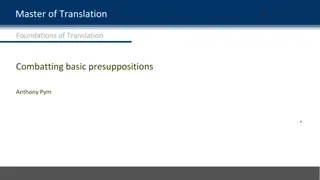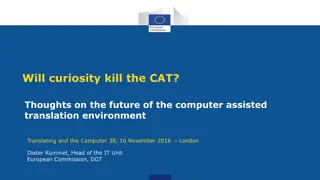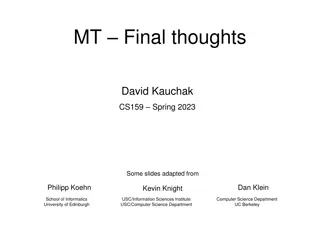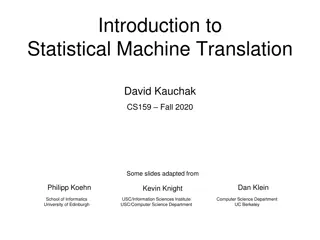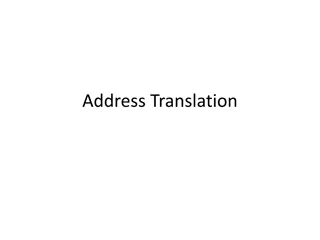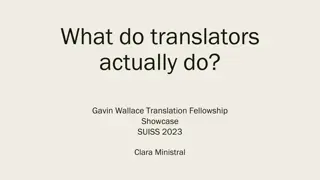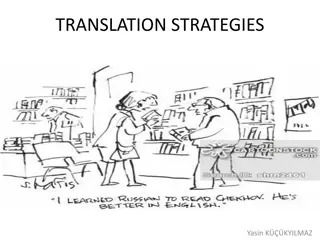Understanding Motivations and Methods in Translation Research
Delve into the complex intertwining of subjectivity and objectivity in translation research, exploring the role of motivations, ideologies, and knowledge dissemination. Discover the application of strong empiricism in formulating hypotheses, testing validity, and refining understanding through data collection. Uncover the potential of machine translation in crisis communication scenarios and the structured process of classical thesis development. Explore dialectical empiricism in revealing concealed truths and ethical considerations.
Download Presentation

Please find below an Image/Link to download the presentation.
The content on the website is provided AS IS for your information and personal use only. It may not be sold, licensed, or shared on other websites without obtaining consent from the author. Download presentation by click this link. If you encounter any issues during the download, it is possible that the publisher has removed the file from their server.
E N D
Presentation Transcript
Motivations and methods in translation research Anthony Pym
To see where we are. If you are motivated, then you bring in your own ideologies, expectations, and desires. If you are doing research, you offer knowledge that is of use to all and can be applied in many situations. So how do we fit between subjectivity (motivation) and objectivity (knowledge for all)? (Do you use the first-person singular when you write?)
To see where we are. Not a simple opposition between ESP and LAP (Gile). A third option looms
What is strong empiricism? You ask a research question. You formulate possible answers to that question (hypotheses) on the basis of conceptual analysis. You collect data pertinent to the hypotheses. You test the validity of the hypotheses on the basis of the data. You reformulate the hypotheses. You get more data. You reformulate the hypotheses. Etc. Knowledge is the set of discarded hypotheses (Popper).
What is strong empiricism? Can MT be used for crisis communication? Yes, raw / Only when post-edited / Never Do translations and have them evaluated by prospective users. See when MT works and when it doesn t. Try fixed glossaries and translation memories. Test those translations. Try simplifying start texts. Test those translations You ask a research question. You formulate possible answers to that question (hypotheses) on the basis of conceptual analysis. You collect data pertinent to the hypotheses. You test the validity of the hypotheses on the basis of the data. You reformulate the hypotheses. You get more data. You reformulate the hypotheses. Etc. We will know when MT fails and we will have some strategies for improving it. Knowledge is the set of discarded hypotheses (Popper).
What is strong empiricism? (A classical thesis structure) You ask a research question. Introduction (question) You formulate possible answers to that question (hypotheses) on the basis of conceptual analysis. Literature review (old answers) Methodology (how to get new answers) You collect data pertinent to the hypotheses. Hypotheses You test the validity of the hypotheses on the basis of the data. Variables Operationalization You reformulate the hypotheses. Results (Data) You get more data. Discussion (test hypotheses on data; relate findings to literature review) You reformulate the hypotheses. Etc. Conclusion (findings, limitations, new hypotheses) Knowledge is the set of discarded hypotheses (Popper).
What is dialectical empiricism (to risk a characterization)? You set out to show what your group thinks is ethical or true and yet concealed. You gather illustrations of what you think is unethical or untrue. You show how the unethical or untrue can be revealed and corrected. You urge others to do the same. Optional step: You formulate a call to action beyond research. Knowledge comes when you try to change the world ( es kommt aber darauf an )
What is dialectical empiricism (to risk a characterization)? Translators in the US try to be invisible. You set out to show what your group thinks is ethical or true and yet concealed. Invisibility leads to low pay, low social status, few translations and xenophobic culture. You gather illustrations of what you think is unethical or untrue. You show how the unethical or untrue can be revealed and corrected. Visible translators can change all of that. You urge others to do the same. Denounce invisibility! Optional step: You formulate a call to action beyond research. Translators of the world, be visible! Knowledge comes when you try to change the world ( es kommt aber darauf an )
What is dialectical empiricism (to risk a characterization)? Introduction (the idea to be demonstrated) You set out to show what your group thinks is ethical or true and yet concealed. Theory (concepts and history of the idea) You gather illustrations of what you think is unethical or untrue. Application of theory 1 Application of theory 2 Application of theory 3 You show how the unethical or untrue can be revealed and corrected. You urge others to do the same. Optional step: You formulate a call to action beyond research. Conclusion (optional call to action) Knowledge comes when you try to change the world ( es kommt aber darauf an )
How much data? Positivism: Data produce truth. Induction: Data correct bad ideas. Deduction: Clear, falsifiable ideas tell us which data to collect. Activism: Data demonstrate an argument. The question is not just how much data, but what is the role of ideas and motivations.
Kinds of data Quantitative: numbers Qualitative: language Mixed methods: both In the humanities, quantitative data alone will not indicate causation.
Spot the cause 100 When I get on a plane, the earth s water levels rise. 90 80 When I get vaccinated, the community s wellbeing is enhanced. 70 60 When translation is community-based, vaccination increases. 50 40 August Sept. Oct Oct Oct Hume Victoria
Rhizomatic causation The rate of deaths increases. Messaging comes from religious and community organizations ( attractor 1 ) Audiovisual messaging comes from medical staff ( attractor 2 ) Anti-vaccination social-media messaging increases. Press reports increase. There is debate around family tables. The energy in the system increases. Uncertainty increases. Trust increases. The number of vaccinations increases. Macreadie, R. (2022-25) Doctoral project: Language is (not) a barrier : Towards effective translation policies and practices for official communication with culturally and linguistically diverse (CALD) communities in linguistically superdiverse cities . University of Melbourne / KU Leuven. Even-Zohar, I. (2016). Ideational labor and the production of social energy. Intellectuals, Idea Makers and Culture Entrepreneurs. Culture Research Lab.
Early Modern perspectivism Masolino s St. Peter Healing a Cripple and the Raising of Tabitha (1425).
Early Modern perspectivism Masolino s St. Peter Healing a Cripple and the Raising of Tabitha (1425).
Modernist perspectivism Science is the knowledge of many, orderly and methodically digested and arranged, so as to become attainable by one. John Herschel, A Preliminary Discourse on the Study of Natural Philosophy (1831) Ray, C. R. (2004). Imperialism and empiricism: Science and state in the age of empire. Doctoral thesis, Duke University
Modernist perspectivism (with thanks to Jorge Lpez) Castro-G mez, S. (2005). La Poscolonialidad explicada a los ni os. Editorial Universidad del Cauca.
So is empiricism imperialist? How can we answer that criticism? Admit that the observer is part of the observation. Are we hidden gods? No, we are people doing things in a particular part of the world. Should we talk about ourselves and forget the role of data? No, we have to test ourselves against data. So what is the problem? There is little testing going on research begins from a belief rather than a bet.
An epistemology without data Bullshit is related to, but distinct from, lying; the liar tells untruth, the bullshitter aims to convey a certain impression of themselves without being concerned about whether anything at all is true. Harry Frankfurt, On bullshit (2005) Within organizations bullshitting is considered to be a social practice that people engage with to become part of a speech community, to get things done in that community, and to reinforce their identity. Andr Spicer, Playing the Bullshit Game: How Empty and Misleading Communication Takes Over Organizations (2020)
An empiricism with involvement The possibilities of helping to produce truth depend on two main factors: the interest one has in having the truth known (or inversely, in hiding it from others and from oneself) and the capacity one has to produce it. As Bachelard put it, there can only be a science of that which is hidden. Sociologists are best armed to dis-cover what is hidden when they have the best scientific weapons, when they best use the concepts, methods and techniques developed by their predecessors [ ]. And they are most critical when their conscious or unconscious intention is most subversive, when they are most interested in revealing that which is censored or suppressed in the social world. (1980, 22-23, italics in the text) Bourdieu, Pierre. 1980. Une science qui d range. Interview with Pierre Thuillier, La Recherche 112 (June 1980). Reprinted in Questions de sociologie. Paris: Minuit. 19-36
A please and some recommendations Confronting bullshit, ask How do you know? Use whatever model communicates best in your discipline. Be aware of your motivations. State your motivations. Confess initial ignorance. Test your hopes and desires on the basis of evidence. If uncertainty doesn t sell, try self-discovery .
